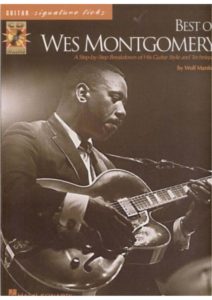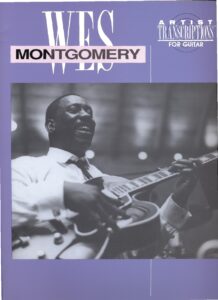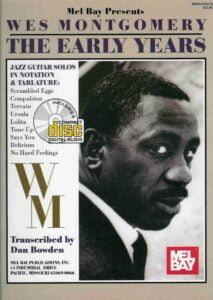Come join us now, and enjoy playing your beloved music and browse through great scores of every level and styles!
Can’t find the songbook you’re looking for? Please, email us at: sheetmusiclibrarypdf@gmail.com We’d like to help you!
Table of Contents
Wes Montgomery (sheet music in the #smlpdf)

Best Sheet Music download from our Library.
Wes Montgomery Wine And Roses By Henry Mancini Solo Guitar
Wes Montgomery – Unit 7 Solo Transcription
Wes Montgomery – Artist Transcriptions for guitar by fred Sokolow, contents:
Introduction • 3
The Wes Montgomery Style• 4
Some Additional Guitar Notation • 9
Discography• 10
The Tunes:
Angel• 18
Boss City • 11
Bumpin’ •22
Bumpin’ On Sunset• 28
Far Wes •34
Four On Six• 40
Goin’ On To Detroit• 50
Movin’ Wes Part I• 55
Movin’ Wes Part II• 92
Mr. Walker • 86
Naptown Blues • 70
Road Song• 76
Serene• 67
Tear It Down • 62
West Coast Blues• 82
Wes Montgomery – Au Privave transcription
Wes Montgomery – Days of wine and roses transcription
Wes Montgomery – Take The A Train transcription
Wes Montgomery Essential Jazz Lines (Mel Bay)
Wes Montgomery Jazz Guitar Artistry arr. by Zafar Soood with TABs. A collection of 14 of Wes Montgomery’s great jazz guitar solos transcribed directly from recorded performances. Included are such landmark solos as Work Song; Sack o’ Woe; Unit 7; Fallout; Jeanine; Blue Roz; Full House; Mi Cosa; Doujie; Missile; Blues; and others. All solos are in notation and tablature. Most of the pieces can be heard on Riverside’s Wes ontgomery: The Complete Riverside Recordings. The new revised edition matches the recordings much ore closely than the first edition, with more detailed rhythms in several pieces. All of Wes’ original solos are faithfully transcribed here in notation and tablature for your study. The book also contains general performance notes, a chronological discography, and a touching biographical essay.
Wes Montgomery The Early Years (Mel Bay) Jazz Guitar Solos Tablature, A selection warm, sumptuous and bluesy jazz guitar solos from the early years of Wes Montgomery’s career. All transcribed for standard notation and tablature by Dan Bowden. Includes CD of demonstration tracks for each of the nine solos and a summary of the transcribed music. Contents page download:
Wes Montgomery, The End Of A Love Affair Guitar Tabs
Please, subscribe to our Library.
If you are already a subscriber, please, check our NEW SCORES’ page every month for new sheet music. THANK YOU!

Joe Pass & Ella Fitzgerald – Duets in Hannover 1975

Track Listing:
00:50 Laura 04:25 Wave (Vou te contar) 09:50 My Funny Valentine 14:05 You Stepped Out Of A Dream 18:57 You Turned The Tables On Me 23:33 Darn That Dream 27:19 Ella and Joe 27:33 You Turned The Tables On Me 31:50 Cry Me A River 37:34 Nature Boy 39:48 Nature Boy (2nd) 41:32 You Are The Sunshine Of My Life 47:40 Avalon 51:53 Stormy Weather 57:09 One Note Samba 01:03:20 The One I Love (Belongs To Somebody Else) 01:07:20 How High The Moon
Please, subscribe to our Library.
If you are already a subscriber, please, check our NEW SCORES’ page every month for new sheet music. THANK YOU!

Wes Montgomery
Wes Montgomery’s thumb climbed octave
up and down the strings of his guitar
with such rapidity and indolent elegance that in
Just a decade he managed to leave a mark
indelible in the history of modern jazz.
When he finally got someone in New
York (Orrin Keepnews, from Riverside Records)
notice the amazing style of him, a great river
bebop with tributaries of old southern blues and
the skill of master Charlie Christian, this
big boy from Indiana had already fulfilled the
34 years old, certainly old age for the
demographic jazz legends of the fifties and sixties.
Dying in 1968 of a heart attack, he almost
nothing was known about the musician prior to that
historical The incredible jazz guitar of Wes
Montgomery, except for a couple of albums on the label
from the West Coast Pacific Jazz, one of them very
appropriately titled Fingerpickin’: his
technique on the six strings always reminded the
of cotton picking.
The recent publication of Echoes of Indiana
Avenue (Distrijazz), a discovery in all
rule of recorded recordings in your city
birth at some uncertain point in 1957 or 1958,
has come to fill an important gap for
amateurs and scholars. Zev Feldman
producer of the album, was recently shown
on the phone, so proud of the sound result
as well as the circumstances of the discovery, the
studio that accompanies the recording in a
profusely documented script and
feeling of having made history of the genre
from the humble condition of his fan.
Feldman works for Resonance, a label
Los Angeles is not a typical company
but a foundation, the beneficent desire of the
Roy Ayers or James engineer times
Brown, George Klabin. Dedicated to dissemination
of the current “undervalued” jazz of the
Southern California, Klabin and Feldman
They diversified their business a couple of years ago
with the search for “crucial” material for the
history of the genre, which would never have been
edited above. The first jewel of
catalog arrived in 2010: an unpublished concert by
trumpeter Freddie Hubbard. And then
these Montgomery tapes came in.
They appeared in that universal attic that is the
eBay cyber auction page. ‘[The
producer] Michael Cuscuna warned us that
a guitarist had been put up for sale, a certain
Jim Greeninger, who owned them since 1990,”
recalls Feldman. Although his
existence, it quickly became clear that the
style of that virtuoso could not be other than that of
Wes Montgomery.
Nor was there any doubt about the importance of
discovery: it is not only that the legacy of
instrumentalist is meager with respect to the
production of other key names in jazz, is
that his art took such a commercial drift after
signing for the Verve label in 1965 which, according to
some fans, a good part of their
his discography is uninteresting. In his notes to
edition, Cuscuna himself, one of the
most respected producers in the business,
He corroborates: “There are so many recordings
floating through the universe in these times that
they run, I wouldn’t have been bothered by the
news if it weren’t for the fact that the protagonist was
Wes Montgomery. Of all the giants of the
jazz from the fifties and sixties, from none
There are fewer records than of him.”
“I made three trips in the next two years to
Indiana,” explains Feldman. There he discovered the
avenue that gives its title to the album, center of
operations of our man and others
jazzmen and heart of “the community
African American of that time in the city.”
He also found the musician’s family, who
provided a lot of unpublished photographs
(here reproduced), as well as two valuable
texts that accompany the CD (and its luxurious
vinyl version) and come signed by the
Wes’s brothers, bassist Monk (1921–1982)
and the pianist Buddy (1930-2009), with whom the
guitarist formed a stable trio in the golden years.
The figure of the Doctor was also key
David Barker, musician and educator of the
Indiana University. “I found him looking for
people who would have frequented him in those
times prior to his first contract
record company, because what seems clear is that
These recordings were made with the idea of being
taught to get one,” continues
Feldmann.
When he listened to the recordings, a
menu made up of standards, funky songs and
ballads, the variety of which reinforces the idea that
was cooked to demonstrate versatility to a
potential employer, the springs of
Barker’s memory got going and
he was identifying each of the members
of the three formations heard in the
ribbons. Except for one: the bassist who participates in
the first and the fourth take.
Browse in the Library:
Or browse in the categories menus & download the Library Catalog PDF:
